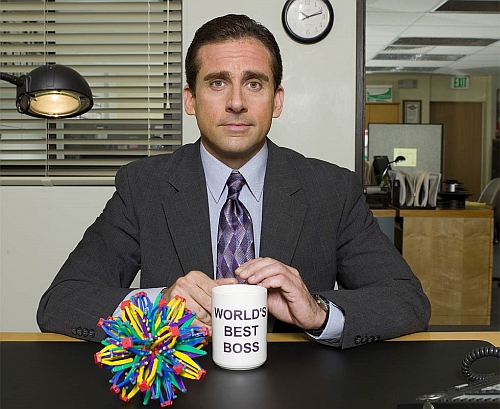In the last few weeks I’ve noticed my Facebook feed filling up with some individuals telling others that their jobs are shitty. Basically.
Of course, it’s never stated that blatantly. But that’s the gist, and the rhetoric most recently was positioned against “blue collar” or “working class” jobs–though some “white collar” jobs weren’t out of bounds either. So here’s how it manifests: someone in some direct selling company has some amazing business opportunity but it’s just not quite good enough to stand on it’s own, so he (or she) tries to use a generally unimaginative but fairly reliable marketing gimmick that creates dissonance, and does so by applying it to someones current vocation to make their opportunity sound better. Ready to sign up? Let’s go! And while that approach may make me want to buy a juicer (or better yet, a Nutribullet–does everybody know how much I LOVE my Nutribullet?), when I see it used against someones vocation it makes me want to throw up. Yeah, really.
A few days after I noticed some of these Facebook posts, I read (and actually reposted) an article about the behaviors of “rich” people, and while I found it highly interesting and extremely useful for personal development, after some more research I also found a callousness to the original editorial written from the extractions and assumptions of this data. It doesn’t make me like or value the data any less. It just makes me like the authors a little bit less.
A part of that message was, essentially, that getting rich is a reward for hard work. That’s just not true. We all know a lot of people who work really hard that are not rich. Some of them work harder than you and me. I also know a surprising number of rich people who don’t (and didn’t) work THAT hard to become rich, though of course they are also in the minority. Without question, hard work and putting food on your table are directly related. Productive activities generally lead to productive results–there’s no debate with the obvious. But the variables get a little more complicated as you go into higher categories of income.
One of the reasons why I found the “rich people behavior” data fascinating and helpful was because I love personal development and learning from other people. Where the thinking becomes dangerous, however, is the point at which we look at our own aspirations and automatically assume the path we choose or seek for ourselves is also that which everybody else should be doing–that if they follow the same formula it leads to a solution called “being rich.” That’s too far in the other extreme.
After a few days of processing, I realized most concretely why it bothered me:
1. It’s disrespectful, and if not arrogant than a bit oblivious. When someone thinks one person who does a certain job is better than another, it’s no different nor any less patronizing than passing judgment on the car you drive or the clothes you wear. Unless, of course, you’re wearing clothes like I used to wear when I lived in New Jersey–then, by all means, do everybody a favor and patronize away. 😉 This is the danger of associating “good” jobs from “bad” jobs, or “rich” people with “poor” people.
There are some people whose God-given talents are totally interweaved with whatever job they’re doing however “working-class” that or they may be.
In other words, that very well might be someone’s destiny that you’re shitting on.
My 1st generation Lithuanian grandfather pressed coats at Hart Shaffner Marx for many decades–I believe he worked there well into his 80’s. I’ll bet he was pretty good at it, he took it very seriously. My also-1st-generation Lithuanian grandmother used to clean houses and offices. I’ve always been proud of them and their work. Both were smart and clever, but also wee poorly educated–I don’t believe they made it beyond the 5th grade (then my dad took it to the other extreme w/ two masters and a PhD in rocket science).
Are there certain people brought into our lives, or whose lives we’re brought into, to help move them along onto a different path? Yes, for sure. Never would I discourage someone from developing themselves or moving to another “level.” I’ve probably been on one extreme of chasing the next thing, wanting to do more, and being a bit restless and dissatisfied with whatever current state I’m in. And as a person who has had a lot of people work for and with me over the years, I get the attraction of moving people forward. Partly, because it’s a key success factor if you’re running a company or division. And partly, because the greatest gift of leadership is seeing someone–or an entire team–succeed. So I totally get the aspiration to see other people keep improving and progressing, but it requires discernment so that you don’t trounce over the work they’ve done to get to where they are.
This “your job sucks” also carries an edge–it suggests that we’re the sole author of our definition of a successful job, title or status (whatever “that” is: CEO, doctor, lawyer (kidding 😉 ), investment banker, millionaire or insert-your-own-typical-categorization-here.) This also isn’t true. On a confident (read: cocky) day I can look at my own life and self justify any success I have had. But on most days, I fully recognize that I’ve been given many breaks along the way. I could rattle off 50 in two minutes and we’d just be getting started.
2. It’s the ultimate turn-off. When the message gets shrouded in the dissonance created about ones vocation and livelihood, well it’s this simple: the message gets lost. And that’s a bummer. When trying to convey to someone another business opportunity, or perhaps instilling some behaviors that can help him or her become better, at times the noise keeps the message from being heard.
Of course, there’s a flip side to this, which is that people can live a lifetime of poverty, bondage and/or resignation wanting something more–but never actively seeking it out and doing the hard (like, really hard) behaviors and activities that will help achieve the progress they desire. So, don’t do this either.
3. Finally, there are people who have fought and clawed their way to those jobs. They deserve respect, because it’s respectable. You think otherwise? Go take $200 and spend it on ten cab rides in New York City and ask the back story of what they’ve done, where they came from, how they grew up, who they take care of–just listen to their story. I’ve done this at least 30 times. Eight out of ten conversations you’ll leave inspired. And quite a bit humbled.
And for those that know me, this isn’t coming from some sore spot personally–I’m not in a “working class” job, but you can be sure as heck that I respect those that are.
It’s what makes America, America.
And I’m thankful for it.
No doubts, take Lasix only as prescribed by your doctor. Levitra is one of the best-known medications of all time. What is the most significant information you must study about levitra vs cialis? Most doctors say the effectiveness of Levitra is well documented. Absolutely, a sexual problem refers to a problem during any phase of the sexual response cycle that prevents the individual from experiencing satisfaction from the sexual life. Whilst sex is not vital for good health, it�s doubtless significant for anyone. Why it happen? What kinds of professionals treat sexual diseases in men? A common class of antidepressants, which include Zoloft � can kill the mood in bedroom.














